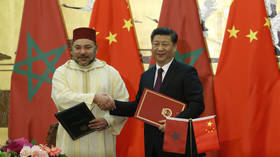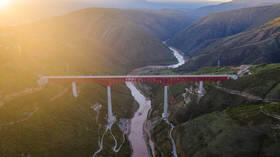America builds military bases around the world. China builds economic ones
Beijing’s new deal with Rabat, which could turn Morocco into a key trade hub for Europe and Africa, shows how China is using strategic thinking rather than military muscle to extend its influence globally.

Morocco is a strategically important North African country that sits at a crossroads between multiple regions of the world. To its immediate north is the Iberian Peninsula and the Mediterranean Sea. To the south and east is the rest of the African continent, and to the west is the vast Atlantic Ocean and the Americas.
This advantageous position has been noted in Beijing, and so it’s no surprise that in one of China’s first diplomatic engagements of 2022, Ning Jizhe, vice chairman of the National Development and Reform Commission (NDRC), signed a deepened Belt and Road Initiative cooperation plan with Morocco’s Foreign Minister Nasser Bourita.
While Morocco has been a formal member of the BRI since 2017, the cooperation plan is a more specific roadmap which, according to the Global Times, “will further deepen practical cooperation in a variety of fields, including infrastructure construction, logistics, trade, investment, agriculture, fishing and other fields, while further promoting the BRI construction with already signed economic and strategic plans.” Some news outlets have described this agreement as a “strategic partnership,” with the clear implication that Morocco’s importance to China is growing in significance.
Morocco offers an opportunity for China to increase its economic footprint and clout in Europe and the Mediterranean – without the political liability of actually being in Europe. Since the BRI was created, China has eyed the wider Mediterranean region as a particular area of interest where it can extend its influence on the continent.
This has included the acquisition of Piraeus port in Greece, the construction of the Serbia-Hungary railway (linking the Balkans with Central Europe), the building of Haifa port in Israel – a deal the US failed to block – and the incorporation of Italy into the BRI in 2019.
However, China’s attempts to expand the BRI further into Europe have run into difficulties. Even though Beijing acquired a deeper stake in Piraeus port late last year, political tensions have seen Chinese state-led investment in Europe stall.
In Rome, Mario Draghi, who became Italian prime minister in February last year, has taken a dimmer view of Chinese investment and vetoed a number of takeovers of local companies. While he has not pulled Italy out of the BRI, his Eurocentric foreign policy philosophy means any attempt by Beijing to invest deeper in the country on strategic infrastructure is likely to be rebuffed. This means China needs a new strategic gateway to expand its reach into Europe.
In late 2021, as the geopolitical situation continued to evolve, we saw a new pattern in China’s foreign policy strategy, whereby it began to focus on the BRI in countries it had not previously been affording much attention to, notably Cuba and Eritrea.
Whilst Morocco is not a state currently opposed by the United States – it’s actually in America’s good books, given its normalization of relations with Israel – deeper incorporation into the BRI follows the pattern of China cementing its ties with non-Western nations with greater strategic ambition and less hesitation.
Rabat is an important partner for China. Morocco embraced Huawei 5G, was one of the first countries in the world to get ahead on Covid vaccinations due to Sinopharm, and supported China’s position on alleged human rights abuses in Xinjiang at the United Nations.
This shows the relationship is a multi-faceted one – not just commercial, but politically minded too. As a post-colonial African state, Morocco shares China’s outlook on national sovereignty and non-interference, which is a useful hedge against the West. And so Morocco has no qualms about inviting China to expand its footprint there without political pushback, on the premise its own affairs are respected.
As Morocco is such a politically reliable partner, China envisages the country to be the Western link of its Mediterranean strategy – a platform from which to export goods and services into Europe (in particular Spain, Portugal, France, Italy) and even perhaps, more ambitiously, onwards to the Americas.
As an example of what this might entail, using examples from other BRI projects, it could see the building of logistics infrastructure such as warehouses to host and distribute air freight, as was seen when Alibaba partnered with Ethiopian Air to create a cold chain vaccine supply line to Africa.
It may also involve constructing new sea and air ports to make it easier to move goods in and out of the country. One can imagine Morocco becoming a regional hub for in-bound Chinese trade and a launchpad for the wider region – something that would bring money to the country and not constitute a so-called “debt trap,” which is an accusation often levelled at the BRI by detractors.
The strategic consequence of this could potentially be the deepening of Europe’s commercial links to China, which Beijing is determined to achieve despite American pressure and competition. In the process of pursuing this, it has been effectively building around the continent to entrench its commercial interests.
Having established its presence firmly in the Southern Balkans and Greece, China has deepened its partnerships with non-EU and non-NATO countries in Eastern Europe – such as Russia, Ukraine, Belarus and Serbia – and has now opened up a new frontier in North Africa. Unlike America’s focus on its military presence across the world, with its 750 bases in more than 80 countries, these strategic hedges and BRI projects are not designed to pursue hegemony, but to maintain its growth trajectory in a changing world.
The statements, views and opinions expressed in this column are solely those of the author and do not necessarily represent those of RT.
https://www.rt.com/op-ed/545300-china-morocco-belt-road/




0 Comments:
Post a Comment
Subscribe to Post Comments [Atom]
<< Home